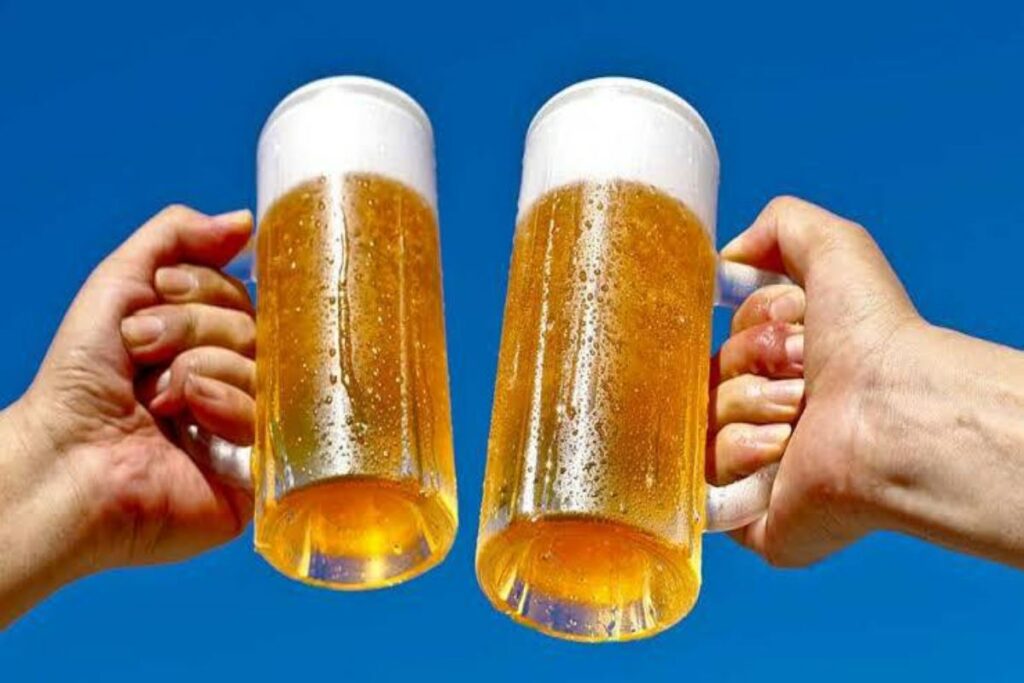As we bid goodbye to winter, It’s almost time for barbecues and outdoor picnics!

It’s general knowledge that a nice cold beer is the best companion to grilled hamburgers and hot dogs. We bring beers on the boat, pack them in coolers to take to the beach, and pick them up before games. Besides, dedicated summer ales pop up during the year’s warmer months.
So, the question is, is beer good for your health? According to registered dietitian Chris Mohr, alcohol is one of the fundamental components of beer that gives it an unhealthy glow. Alcohol is one of beer’s main draws: It’s an ingrained part of social culture worldwide.
However, it’s also a toxic substance. According to multiple studies, excessive alcohol consumption can lead to various health problems. It can cause high blood pressure, cancer, a weakened immune system, cognitive dysfunction, mental health problems, and alcohol dependency.
ALSO READ: Kid Rock Softens His StanceToward Bud Light As He’s Spotted Drinking a Can of the Beer
Alcohol also has stimulant effects that impact sleep, which can affect overall quality of life. Hence, there’s no magical beer that will help your health. “It doesn’t matter where the alcohol is coming from; what matters is the overall alcohol, the ABV,” Mohr says.
“So whether that’s from beer, whether that’s from wine or whatever other liquor, it’s the alcohol itself,” he added. According to Mohr, the healthiest beer has the lowest ABV, or alcohol by volume. The National Institute on Alcohol Abuse and Alcoholism says a standard drink of regular beer is a 12-ounce beer that contains 5% alcohol.
However, a quick trip to the beer will have you consuming beers with 8% ABV or some as high as 18%. “You think you’re drinking one beer, but you just had two drinks in one can,” Mohr says. Over the past decade, there has been a rise in “health” beers that boost electrolytes, antioxidants, and key nutrients.
POLL—Do You Support a Single-Payer Healthcare System (Medicare for All)?
Mohr says beer lovers should not be fooled. The dietitian claims most of this is marketing language to get consumers to “justify their alcohol consumption.” “If beer is our source of antioxidants and nutrients, then we have a lot of other issues we need to consider,” Mohr says.
“There are a few (beers) that are fortified with various ingredients,” the dietitian adds. “But I certainly wouldn’t turn to beer as my choice of nutrition.”
According to the Centers for Disease Control and Prevention, moderate drinking is one drink for women and two drinks for men in a single day. There has been some research suggesting a lower risk of diabetes for frequent drinkers compared to those who didn’t drink.
ALSO READ: Report Says Lauren Boebert Was Cut Off from Drinking More Alcohol at GOP Gala
Another study found favorable effects on HDL function, or “good cholesterol,” in moderate beer intake. However, some studies have been saying no level of alcohol consumption improves health. Consequently, there isn’t an amount of beer you can drink daily that would be good for you.
While this is not a “never drink alcohol” message, Mohr says the benefits of not drinking outweigh that of drinking. Beer can also impact weight; alcohol itself has calories, but it’s not acting alone.
We’re more likely to overeat when our inhibitions are lower. Also, since alcohol is a toxin, your body is going to work to get rid of it first. As a result, it will take longer for the other food in your system to digest.
You Might Also Like:
Jimmy Kimmel Fires Back at Donald Trump’s Rant With Prison Reminder
Oklahoma Officials Ban Trans Pro Wrestler From Competing in the State
“Woke” Hollywood Gets Another Disappointing Box Office Return
North Carolina High School Suspends Student for Using the Term “Illegal Alien”
Ohio GOP Officials Refuse Democrats’ Plan to Put President Joe Biden on November Ballot
